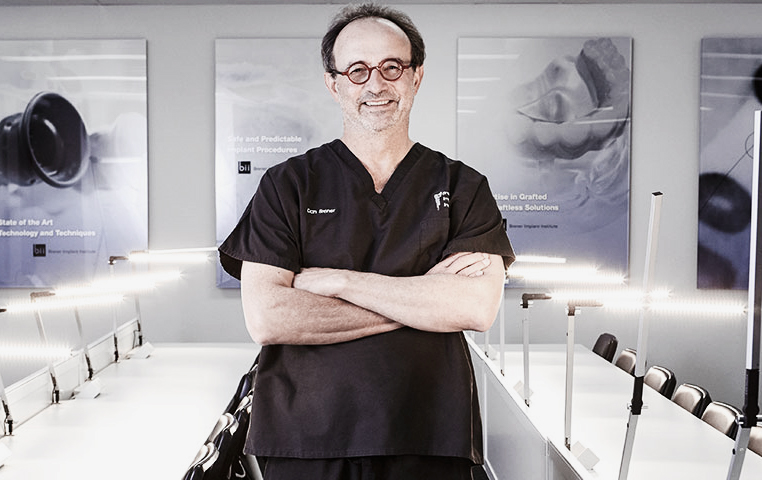How Dr Michael Tam built two dental practices
After moving away from his roots in North Sydney and building a successful dental practice on the other side of town, Dr Michael Tam returned and did it all again.
Learn More![]() 4 minutes
4 minutes

Associate Professor Dan Brener didn’t plan to be a teacher, although he always had a passion for it. While working as a prosthodontist he identified a gap in dentists implant training and this was his primary drive to create the Brener Implant Institute (Bii).
“Dentists weren't trained in implant treatment,” he explains. “A big problem is that the bone sometimes faces the wrong direction from where a restoring dentist needs it to place the crowns. So it becomes almost impossible to restore some of these implants—if the implants are loaded in the wrong direction, they can loose bone and fail.”
Associate Professor Brener decided to look into the problem. Ten years after graduating, he travelled to the United States for surgical training. Numerous requests to perform guest lectures about implant surgery convinced him that there was a need for training. In 2003 he opened Bii. The aim of it, he says, is “to teach dentists safe surgery and to elevate the standard of implant dentistry in Australia.”
There are several acknowledged areas of specialty in the dental profession. But implant dentistry isn’t one of them.
“The Dental Board of Australia actually encourages dentists to go to programs that provide hands-on supervision,” he explains, “and Bii’s is the only one in Australia that provides hands-on supervision for all aspects of bone grafting, sinus grafting and dentoalveolar aspects of implant surgery and implant placement.”
The practical and hands-on nature of the Master Implant Program at Bii is one of the keys to its success. The process involves dentists attending a series of lectures over seven weekends and includes live demonstrations and hands-on lab work. Dentists treat their own patients individually under Bii’s supervision, Associate Professor Brener says. “So in any one weekend a dentist could do a surgery himself and observe another four or five surgeries live. Their learning curve accelerates greatly, because they will also see any intra-operative complications that occur and how to deal with them.”
The process has been made safer by huge advances in technology since those early days. “When I started, we were still placing implants with very roughly made guides, we didn't have three-dimensional software planning at all,” says Associate Professor Brener. Now patients can be assessed on the spot using cone beam scans and 3D modelling.
“We can now trace nerves, and place implants electronically,” he adds. “That is really taking out a lot of the human error that has been in implant dentistry.” However, as Bii grew Associate Professor Brener realised that students faced another problem.
“It takes a significant amount of time, effort and money to set yourself up for implants,” he says.
“So we asked if BOQ Specialist would be interested in financing the dentists that go through Bii’s program.”
Associate Professor Brener chose BOQ Specialist because of his long standing business relationship with their team, dating back to when he started his very first practice.
When he first graduated from the University of Sydney and planned to open his own practice, he approached the major banks. All of them turned him down. “The four big banks and the non-specialist medical and dental lending centres, have no idea about the ins and outs of what we do as dentists and the potential that we have,” he says.
However, that wasn’t the case with BOQ Specialist. It was their understanding of his business that meant they could arrange the necessary lending to get started, and he has dealt regularly with them since that time.
“What I can say about the BOQ Specialist team, is that we've known each other for a long time and they have been very, very forthcoming in helping Bii’s program by arranging finance for dentists participating in the program,” he says. “So when the time came for me to buy a cone beam scanner, they already understood my practice, knew my finances really well, and it was a fairly simple matter of just organising the finance for that machine.”
It may have seemed simple to Associate Professor Brener, but a lot goes on behind the scenes at BOQ Specialist to make the purchase seamless. Knowing his practice, BOQ Specialist was able to help him buy the cone beam on his BOQ Specialist credit card—which also earned him Qantas Frequent Flyer points.
“I thought the Qantas Frequent Flyer points would be very handy,” he says. “So I put that all on my BOQ Specialist credit card. So it was a win-win situation for everyone.”
Our bi-annual magazine which features case studies from our clients and gives you first hand examples of how we can help you to grow your business.
The information contained in this webpage is general in nature and has been provided in good faith, without taking into account your personal circumstances. While all reasonable care has been taken to ensure that the information is accurate and opinions fair and reasonable, no warranties in this regard are provided.